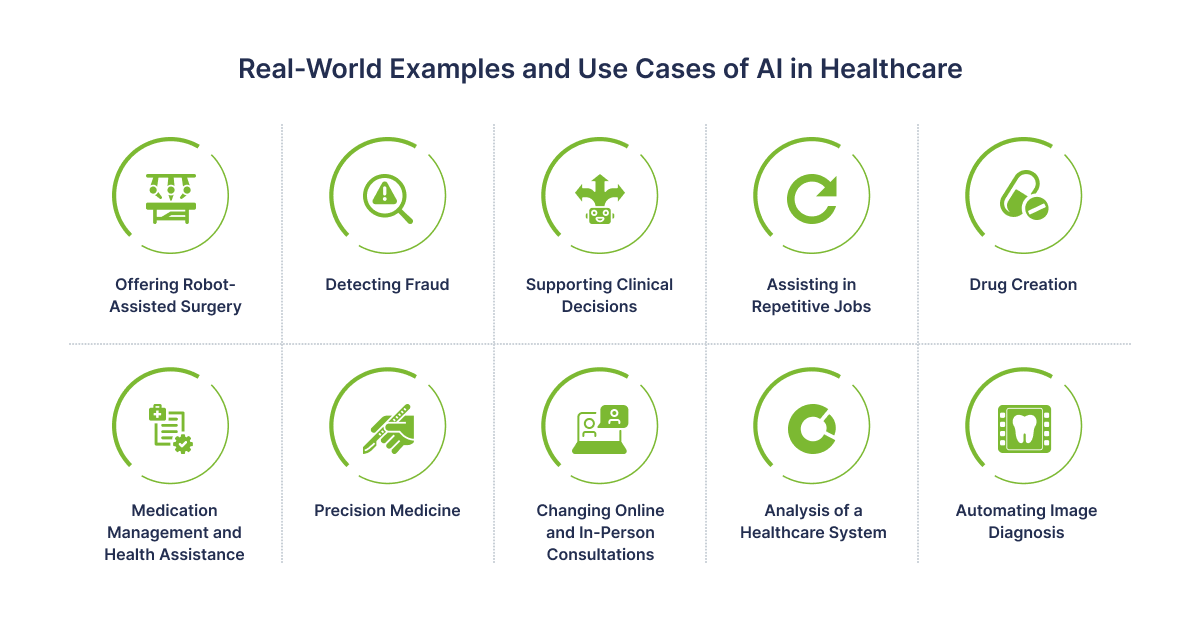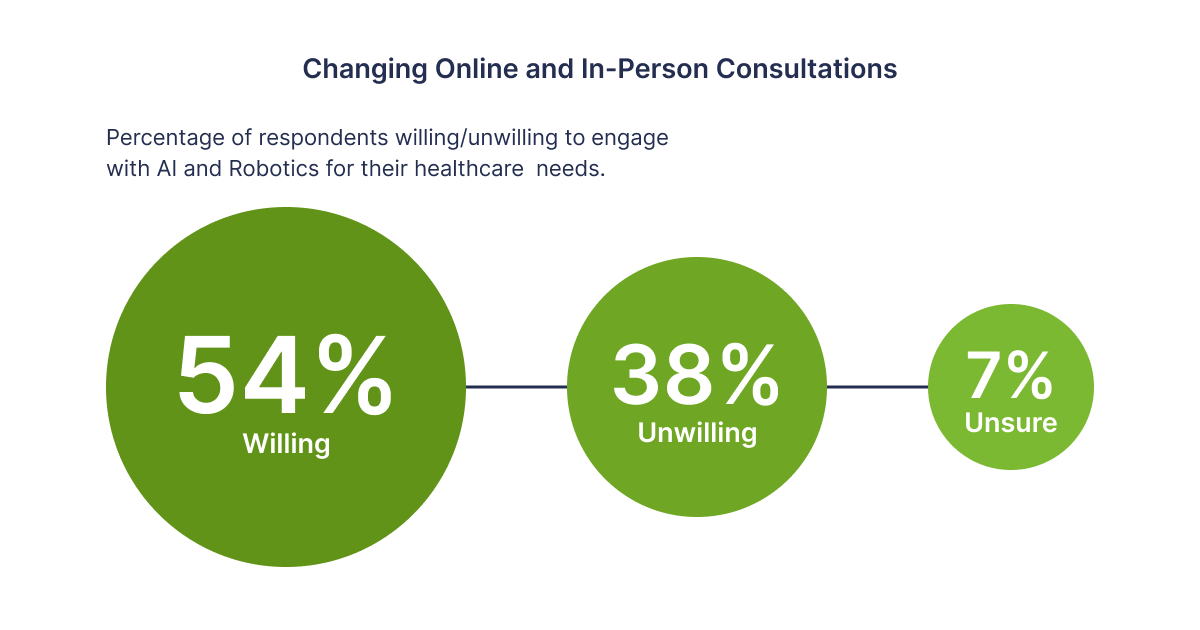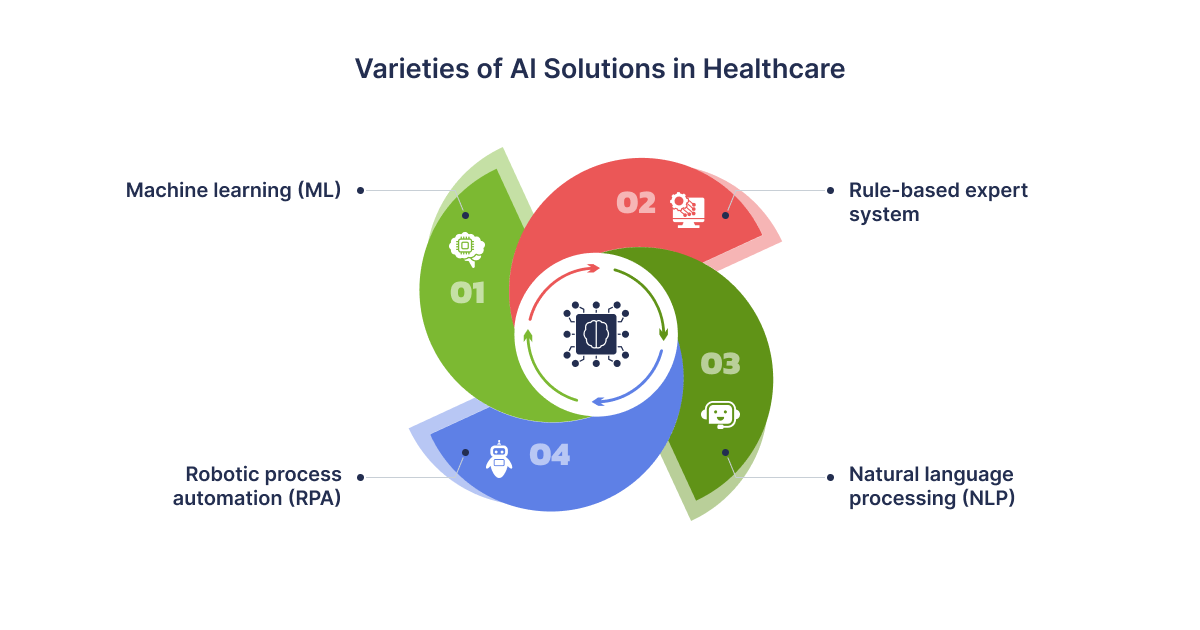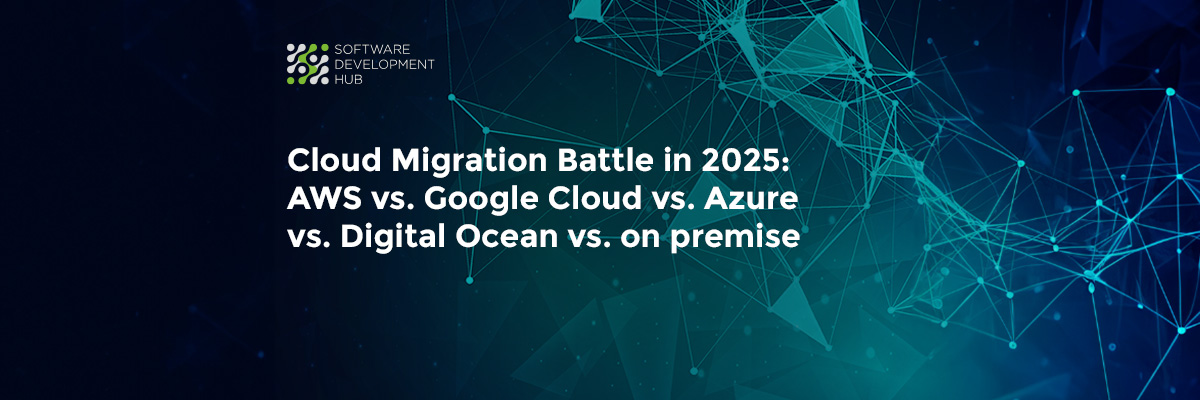How AI in Healthcare Is Transforming Industry
The widespread use of AI in healthcare has changed the way we look at diagnosing, managing, and treating patients. Modern technology contributes to active development of solutions in the medical industry, and development of new, more effective, and safe drugs. Another aspect of the application of AI is the push to improve service, both in terms of quality and responsiveness.
The active introduction of AI in healthcare was facilitated by the Covid-19 pandemic, which led to new challenges and an increase in the burden on the healthcare system. Nevertheless, the unprecedented increase in the incidence has become a springboard for improving the quality of medical services, detection, diagnosis, and clinical trials, where AI plays a significant role.
Forecasts by Statista show that the value of the healthcare AI market will grow to $188 billion by 2030, an increase of almost 37% since the year of 2022. Below, we will look at the main areas of application of AI in healthcare, as well as evaluate the industry's future prospects.
AI Project Classification by the Level of Complexity

Here are just a few examples and options for use of AI in machine learning healthcare as a testament to the revolutionary, transformative role of technology.
Offering Robot-Assisted Surgery
In this industry, AI has found, perhaps, the most widespread use, making a real revolution. AI and robotic manipulations have made it possible to reduce blood loss during operations, eliminate pain, and minimize other side effects. And this is not to mention the greater accuracy of the surgical intervention, which reduces the recovery time and makes the course of this period for the patient smoother and less traumatic.
For example, the Maastricht University Medical Center is using AI robots to suture tiny blood vessels (some of them as thin as 0.03 millimeters). With the help of AI in medicine, the surgical community can use information online, assess the patient's current state of health and track it over time. Based on this data, healthcare providers make faster and more rational decisions, which is caused by better treatment outcomes.
Read also: AI for Healthcare
Detecting Fraud
The US Department of Justice says that about 3% of claims against medical service providers are the result of activity of unscrupulous persons or, simply, fraud. But more importantly, because of this, the industry suffers losses of up to $ 100 billion annually. However, the use of AI-based solutions makes it possible to identify false claims, thus making processing, approving, and paying for true claims faster. In addition to dealing with insurance misconduct, AI ensures privacy and protection of patient's personal data and detects suspicious behavior.
Read also: Machine Learning for Fraud Detection
Supporting Clinical Decisions
AI and machine learning in healthcare are changing the way people make decisions. The information identified and provided by AI becomes useful at the stages when diseases are diagnosed, a treatment plan and health maintenance are selected. The technology is indispensable in areas where large amounts of data are used — in ophthalmology, radiology, and pathology.
In the future, there will be possibility to perform certain tasks offline, such as translating clinical records into electronic medical records, simplifies data entry.
Assisting in Repetitive Jobs
Cognitive Assistants is a functioning format the healthcare system is currently moving to. Cognitive Assistants tend to reason, analyze and use the full range of medical knowledge. For example, the recently launched Medical Sieve algorithm has proven its worth in decision-making for cardiac and radiological treatments. Analysis of X-ray images enables to identify possible problems quickly and reliably. An example of healthcare application is Enlitic, which combines deep learning with medical data to provide advanced diagnostics and improve patient care.
Changing Online and In-Person Consultations
Babylon App demonstrates the ability to modify and manage medical consultations with the help of AI. The application contains online medical consultations and services. AI-generated advice is based on the patient's medical history and collected information and therefore is as relevant and accurate as possible in a particular case.
How does the solution work? The user reports the symptoms of the disease, and the program compares the signs according to the available database, using the speech recognition method. After that, the anamnesis and features of the patient's state of health are studied, after which a treatment plan is proposed.
The demand for Artificial intelligence (AI) is growing. This is evidenced by almost halved willingness of users to resort to robotics for counseling. Accordingly, the importance and effectiveness of AI-based healthcare apps are recognized not only by medical professionals but also by end users of services - patients.

Medication Management and Health Assistance
A good example of a drug monitoring solution is the startup Sence.ly. To put it simply, this is a digital nurse with a pleasant voice, whose main tasks are to monitor the health status and to treat the patient. To serve patients with chronic diseases in the intervals between visits to the doctor, machine learning is used to monitor and observe symptoms, and well-being. The last, but not least, the app reminds you to take your medication at a certain time.
Precision Medicine
Genomics and genetics are closely related to AI. Thanks to technology, it is possible to find patterns in processing a huge amount of data in the field of genetics and, as a result, to reveal the relationship between mutations and diseases. Thanks to AI, a doctor can learn about the processes occurring in cells during a genetic change, regardless of the nature of such transformations, whether it is therapeutic, or natural.
Analysis of a Healthcare System
Digitization of health system records simplifies access to doctor, treatment, and clinic data. Medical institutions, in turn, through solutions with AI, generate reports on errors made in treatment. This is necessary in order to increase the level of treatment in the future and refuse hospitalization if it is appropriate.
Automating Image Diagnosis
Perhaps, the most successful application of AI is the use of computer vision for image processing. In solutions for hospitals and clinics, computer vision algorithms are used to analyze various kinds of images obtained in computed tomography and radiology. This contributes to a more accurate diagnosis of tumors, infectious diseases of internal organs, and prognosis for cancer patients.
The work of the visual perception of machines in healthcare can be evaluated by using the UVA solution as an example. The AI and ML technologies at the heart of the tool are used to analyze children's biopsy images when it is necessary to differentiate between conditions and diseases. At the same time, the reliability of diagnosis is as high and reliable as in case the patients would apply to experienced professionals.
Types of AI in Healthcare
The development of AI applications is aimed at solving different problems. Depending on this, the following types of solutions are distinguished:
- Machine Learning (ML), which suggests working with algorithms and data. This makes the work similar to how people learn. ML is used in precision medicine: the technology is used to determine necessary medical procedures, taking into account the state of health and the characteristics of the treatment. A more complex form of ML is neural networks or deep learning models, where a large number of variables and functions are used to predict outcomes (analysis of x-ray images to detect cancerous tumors).
- Natural Language Processing (NLP) involves text analysis, and speech recognition, which is widely used in working with documentation - its creation and classification. The technology is used to analyze unstructured patient data.
- Robotic Process Automation (RPA) - a solution based on automation technologies for training, and execution of business processes, taking into account standards and rules. Such solutions are relatively inexpensive, transparent, and easy to create. In practice, they allow you to automatically perform repetitive tasks.
- Rule-Based Expert System - The simplest form of AI that works on the basis of established rules and aims at solving a problem. Roughly speaking, such an application takes expert-level information from the host and transforms it into rules to apply to the input data. Now such solutions are being replaced by products that work with ML.

The Software Development Hub will help you implement a mobile application or healthcare software with AI. Based on extensive experience in creating digital products in the medical field, we are ready to take on the project from the moment of market analysis to the presentation of the finished application. Flexibility in approach to each project, ownership and constant updating of technology ownership, as well as understanding of the market structure allow us to create applications that meet the tasks and to scale our business.
Categories
Share
Need a project estimate?
Drop us a line, and we provide you with a qualified consultation.








